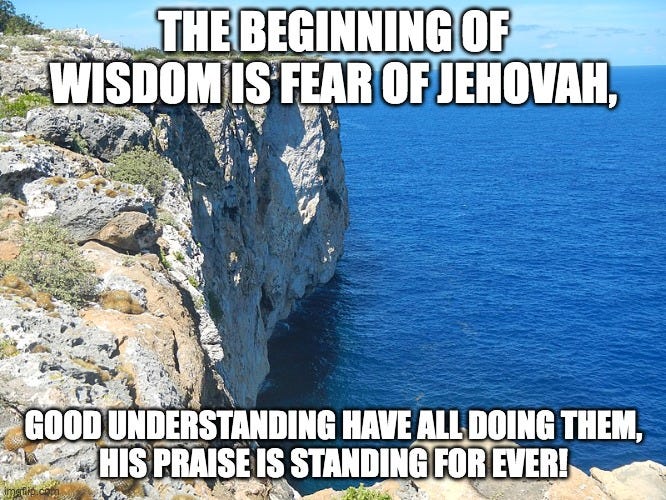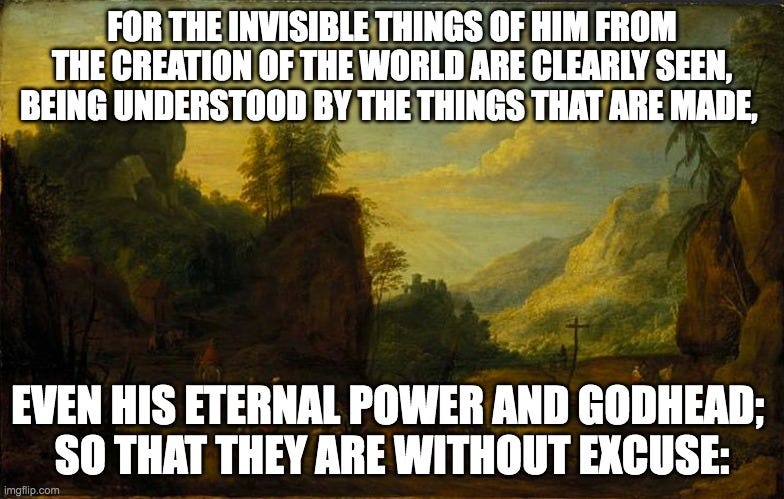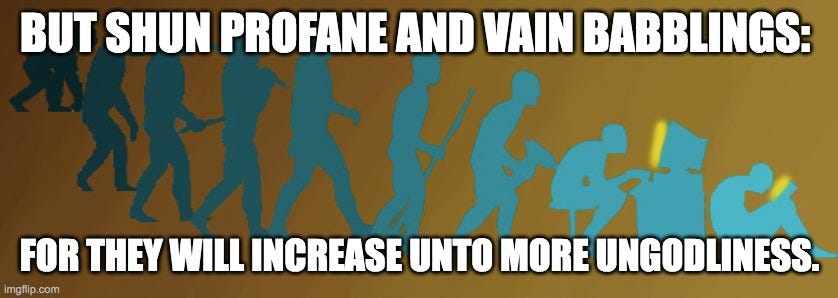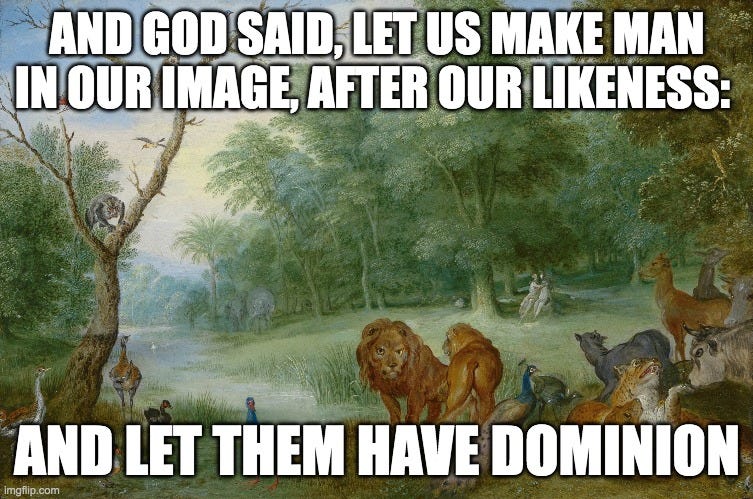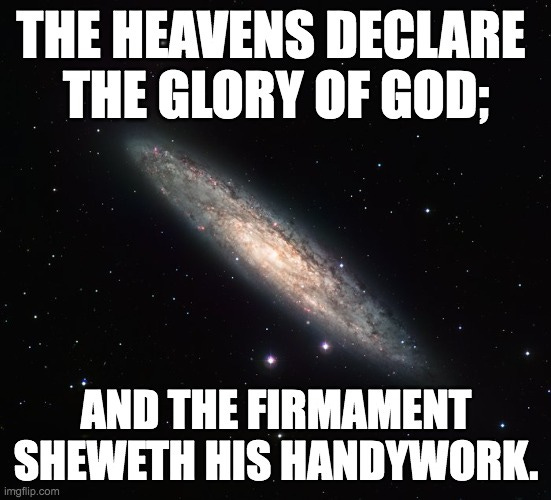EQUIVOCA'TION, noun. Ambiguity of speech; the use of words or expressions that are susceptible of a double signification. Hypocrites are often guilty of equivocation and by this means lose the confidence of their fellow men. Equivocation is incompatible with the christian character and profession.
Webster’s 1828
Words have meanings. Unfortunately most of them have more than one meaning. Well, unfortunately except for Dad Jokes, which seem to depend on those double meanings for their humor. But, outside of Dad Jokes (which are the highest form of humor) these differing meanings can cause all manner of confusion and complexity in our speech.
Most of which is probably done unintentionally. Most of the times when the American is confused at the Brits idea of putting galoshes in the boot, or the Brits are shocked when told that African women don’t wear pants, the problem is ignorance, and the result is confusion.
But occasionally a highly intelligent person can deliberately use the same word, in the same discourse, to mean two very different things… or even more. This has traditionally been called the ‘Fallacy of Equivocation’, and is a bad thing.
Introduction
Carl Allen recently wrote a post entitled ‘The Fallacy of Equivocation’ in which he complained about what he believes is the equivocal use of the word ‘theory’ in many creationist writings. He is, unfortunately, wrong in at least part of his calculus. Often the word is not being used in an equivocal way, but in an ignorant way.
Some of the rest of his analysis is wrong in the other direction. I’m not sure if it has an official name, but I will call it ‘The Fallacy of Exceptionalism’.
Theory
Let’s spend a couple of minutes examining the word ‘Theory’.
THE'ORY, noun [Latin theoria; Gr. to see or contemplate.]
1. Speculation; a doctrine or scheme of things, which terminates in speculation or contemplation, without a view to practice. It is here taken in an unfavorable sense, as implying something visionary.
2. An exposition of the general principles of any science; as the theory of music.
3. The science distinguished from the art; as the theory and practice of medicine.
4. The philosophical explanation of phenomena, either physical or moral; as Lavoisier's theory of combustion; Smith's theory of moral sentiments.
Theory is distinguished from hypothesis thus; a theory is founded on inferences drawn from principles which have been established on independent evidence; a hypothesis is a proposition assumed to account for certain phenomena, and has no other evidence of its truth, than that it affords a satisfactory explanation of those phenomena.
Websters 1828
theory (countable and uncountable, plural theories)
A description of an event or system that is considered to be accurate.
(sciences) A coherent statement or set of ideas that explains observed facts or phenomena and correctly predicts new facts or phenomena not previously observed, or which sets out the laws and principles of something known or observed; a hypothesis confirmed by observation, experiment etc. [from 17th c.]
(uncountable) The underlying principles or methods of a given technical skill, art etc., as opposed to its practice. [from 17th c.]
(mathematics) A field of study attempting to exhaustively describe a particular class of constructs. [from 18th c.]
Knot theory classifies the mappings of a circle into 3-space.
A hypothesis or conjecture. [from 18th c.]
(countable, logic) A set of axioms together with all statements derivable from them; or, a set of statements which are deductively closed. Equivalently, a formal language plus a set of axioms (from which can then be derived theorems). The statements may be required to all be bound (i.e., to have no free variables).
A theory is consistent if it has a model.
(obsolete) Mental conception; reflection, consideration. [16th–18th c.]
Wiktionary
A set of statements or principles devised to explain a group of facts or phenomena, especially one that has been repeatedly tested or is widely accepted and can be used to make predictions about natural phenomena.
The branch of a science or art consisting of its explanatory statements, accepted principles, and methods of analysis, as opposed to practice.
"a fine musician who had never studied theory."
A set of theorems that constitute a systematic view of a branch of mathematics.
The American Heritage® Dictionary of the English Language, 5th Edition
Ignorance
Before going further, I will register in passing a protest against the assumption that working is the one test of humanity. Heaven does not work; it plays…
GK Chesterton
I listened to an explanation of a court case the other day where the judges apparently spent long hours reading dictionaries to determine if installing an in ground trampoline was or wasn’t ‘landscaping’. I remember thinking that, well, the landscaper that installed it, and the family that hired him, both must have thought it was, eh?
Whenever we use words, or hear words used, we need to remember that there are two participants in the exchange: the person speaking (or writing) and the person reading (or listening). The dictionary is not there. It is not one of the participants. Which makes it stupid to object to anything in the speech as ‘not what the dictionary said’. It was not the dictionary speaking, it was the speaker. It wasn’t even the dictionary reading, it was the reader.
So it is literally irrelevant, when a preacher rails against the evil ‘theory of evolution’, that neither he nor his audience have any idea what Carl Allen means when he uses the word ‘theory’. It doesn’t even matter what the dictionary means. What matters is what the preacher means, and what his audience understand.
Exceptionalism
And in this particular case, the preacher, and his audience, have the dictionary on their side. When the preacher says ‘theory’ he definitely means 'something devised to explain’ and ‘widely accepted’… with the caveat that it was ‘devised’ by unGodly atheists and is ‘widely accepted’ by people who are ignorant of the Word of God.
So there is literally no equivocation in what the preacher says to his audience. There is no misunderstanding. Except… that when he says that ‘Those unGodly scientists themselves admit it is just a theory…’ Carl, along with many other scientists, wishes for their definition of ‘theory’ to have more depth.
Unfortunately he doesn’t actually provide that depth for ‘theory’ (unlike for ‘poll’, where he does good work) in his post. He says, “In simplest terms, a scientific theory can be comprised of laws, facts, and other observations to explain some complex phenomenon…”.
Now that’s a pretty paltry definition. It doesn’t really define anything. And then later on he gives us this, “(Evolution being both a theory and a fact is confusing to people who don't understand the proper definitions of the word theory).” Which is itself rather confusing, since, while the study of evolution might involve the study of certain ‘facts’ (although far less than Carl would like) the use of the singular ‘fact’ doesn’t help anything. Can he list that singular ‘fact’ for us?
The Wikipedia article of the same name has a similar confusion between the singular and the plural of the word ‘fact’, but at least provides us with this definition of ‘theory’ as applied to evolution: "well-substantiated explanation". Which Carl does well to differentiate from ‘guess’.
The only problem with that is… that the more well-spoken ID and Special Creation proponents use the word ‘theory’ to mean ‘well-substantiated explanation’ and attack it precisely on those grounds… ie that it is not at all well-substantiated but is, in fact, contradicted by facts and logic at every turn. It is precisely those who understand this best that are the most effective at attacking evolution.
Audience
In the rest of the article Carl ignores or even contradicts one of the most fundamental rules of communication: that you need to speak in words that your audience will understand. When it is pointed out to him that the overwhelming majority of the world understands the word ‘poll’ as ‘prediction’, he dances around on the head of a bass drum shouting about their ignorance instead of doing the hard work of education and defining his terms. (Which, to be fair, he does elsewhere, which is why I recommend you subscribe to his newsletter.)
Indeed he seems to struggle to apply his reasoning to the fact that, for the overwhelming majority, the reason that people use ‘polls’ is because they desire to ‘predict’. That might even be said to be the reason for the stock market ticker.
But, enough about polls. When Creationist or ID speakers use the term ‘theory’ when speaking to Creationist, ID, or even mixed audiences, their use of the word ‘theory’ fits with their audiences understanding of the word ‘theory’. They understand that many scientists are firmly convinced that evolution is true, many others, along with theologians, are firmly convinced it is false. Thus the evolutionists and the creationists can all go to any of the definitions above and agree that that is what is being discussed. ‘A set of statements devised to explain…’ or ‘a theory is founded on inferences drawn from principles which have been established on independent evidence’. There is great disagreement as to what the facts are, what the principles should be, which explanation works best to fit the facts… but there is no functional difference in the way the word ‘theory’ is being used.
Conclusion
Carl would like it if non-experts would stay out of the argument. He would like for everyone to use words to mean just what he, and his fellow experts, mean by them when they use them.
Well, good luck with that but, as well, he would therefore be caught in his own trap. Because ‘evolution’ has ‘theological’ implications. Certain readings of certain religious texts would contradict or alter certain principles in drawing conclusions from certain physical facts. And Carl does not present himself as an expert on either those texts or their interpretation. Thus, following his own rules, he should have nothing to say on the question of evolution vs creation.
Everyone on the face of the earth knows something about something. Some of us know more about more, and all of us know less than others about a lot of things. My French might be better than Carl’s, but he might be able to beat me at Chess. But the rules of the human game is that everyone gets to wax eloquent, if ignorant, about both Chess and French. That’s what being human is all about.
And, when speaking, either using words in a way that your audience understands them, or being willing to spend long, repetitive, hours explaining your terms. And then explaining them again. And then…
Thank you for reading Von’s Substack. I would love it if you commented! I love hearing from readers, especially critical comments. I would love to start more letter exchanges, so if there’s a subject you’re interested in, get writing and tag me!
Being ‘restacked’ and mentioned in ‘notes’ is very important for lesser-known stacks so… feel free! I’m semi-retired and write as a ministry (and for fun) so you don’t need to feel guilty you aren’t paying for anything, but if you enjoy my writing (even if you dramatically disagree with it), then restack, please! Or mention me in one of your own posts.
If I don’t write you back it is almost certain that I didn’t see it, so please feel free to comment and link to your post. Or if you just think I would be interested in your post!
If you get lost, check out my ‘Table of Contents’ which I try to keep up to date.
Thanks again, God Bless, Soli Deo gloria,
Von


